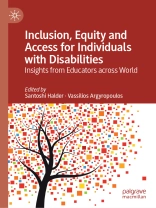The book provides multiple perspectives and insights on the area of Inclusion, Equity and Access for people with disabilities and brings together various inclusive effective practices from 21 countries across the world most comprehensively in one book. The book documents perspectives from educational researchers and teacher educators through first-hand experience using cutting-edge research and conceptual understandings, thought processes, and reflections.
The book brings together various methodologies to expose scientific truths in the area of disability and inclusion. Chapter authors utilize a self-reflective stance, representing state of the art theory and practice for exploring notions of disability. Authors examine cultural relational practices, common values and beliefs, and shared experiences for the purpose of helping cultural members and cultural strangers better understand interdependent factors. Each chapter is an attempt to unravel a thought provoking, comprehensive, and thorough understanding of the challenges and abilities of individuals with disabilities shaped by their own culture, society and country, re-engaging the promise of scientific research as a generative form of inquiry.
The book is designed to be of use to a wide range of professionals; researchers, practitioners, advocates, special educators and parents providing information and or discussions on educational needs, health care provisions, and social services irrespective of country and culture.
İçerik tablosu
Introductory Chapter: Chapter 1 Disability within Contemporary Inclusion Dynamics: A Global Point of View.- Section I: Inclusion and Disability: Social Realms and Conceptual Underpinnings across the World.- Chapter 2 The Differently Abled: Exploring the Rights and Legislation in India.- Chapter 3 Understanding Negative Attitudes towards Disability to Foster Social Inclusion: An Australian Case Study.- Chapter 4 The School to Prison Pipeline: The Plight of African American Males in Special Education.- Chapter 5 Disability and Ukrainian Urban Space.- Chapter 6 Social Inclusion of School-Age Learners on the Autism Spectrum: Review of the Evidence and Future Areas of Inquiry.- Chapter 7 The Role of Non-Formal Learning Environments in Education and Socialization of Children with Visual Disability: the Case of Museums.- Chapter 8 Comparison of Special Education Teachers’ Attitudes towards Various Augmentative and Alternative Communication Systems.- Chapter 9 The Continuing Need for Child Led Approaches within Inclusive Systems: A Focus on Transition across 8 European Countries.- Chapter 10 Improving Inclusion and Access for People with Disability in the Caucasus: the Case of Azerbaijan.- Chapter 11 Inclusive Technical Capital in the Twenty First Century.- Chapter 12 Examining the Inclusion of People with Visual Disabilities in Workplace: a Greek Case Study.- Chapter 13 Training Experts in Inclusive Practices for an Equity on Access to Culture in Europe.- Chapter 14 Inclusive Employment Plight of Youth with Complex Communication Needs.- Chapter 15 Kicking a Goal for Inclusion in Sports Clubs and Stadia.- Chapter 16 Breaking Down Silos: Women with Disabilities, Issues, Voices and Concerns in Family.- Section II: Identifying Enablers, Barriers and Challenges in Inclusive Education.- Chapter 17 An Ethnographic Research on Inclusive Education in Colombia: Lessons Learned from Two School Visits Chapter 18 Towards Inclusive Education in Singapore.- Chapter 19 The Role of Self-Advocacy in Academic Access for Students Who Are Deaf or Hard of Hearing in Higher Education.- Chapter 20 Identification of Specific Learning Disorders and Specific Language Impairment: Issues and Experience in India.- Chapter 21 Developing Inclusive Education Policy in Sierra Leone: A Research Informed Approach.- Chapter 22 Inclusive Education in Japan: Current Trends and Teachers’ View.- Chapter 23 Positive Behaviour Support Model for Inclusion of Children with Autism Spectrum Disorder.- Chapter 24 Inclusive Practice through Layers of Learning Intervention.- Chapter 25 Inclusion in Home, Social and Educational Settings for Children with Autism in India: Enablers and Challenges.- Chapter 26 Barriers and Enablers to Inclusion of University Students with Disabilities in India and Australia.- Chapter 27 Providing for the Needs of Young People with Disability in Lebanon.- Chapter 28 Empowerment of Students with Disabilities in University Setting.- Chapter 29 Facilitating Factors and Barriers in Implementing Inclusive Education in Romania.- Chapter 30 Educational Support Teams’ Perspectives on Inclusion of Learners Who Use Augmentative and Alternative Communication in South African Mainstream Schools.- Chapter 31 Strength Based Instruction (SBI): a Systematic Instructional Training Model with a Primary Focus on a Child’s Strength.- Concluding Chapter: Chapter 32 Challenges and Strategic Pathways to Participation, Equity and Access.
Yazar hakkında
Dr. Santoshi Halder is Associate Professor at Department of Education, University of Calcutta, Kolkata, India.
Dr. Vassilis Argyropoulos is Associate Professor at Department of Special Education, University of Thessaly, Volos, Greece.











